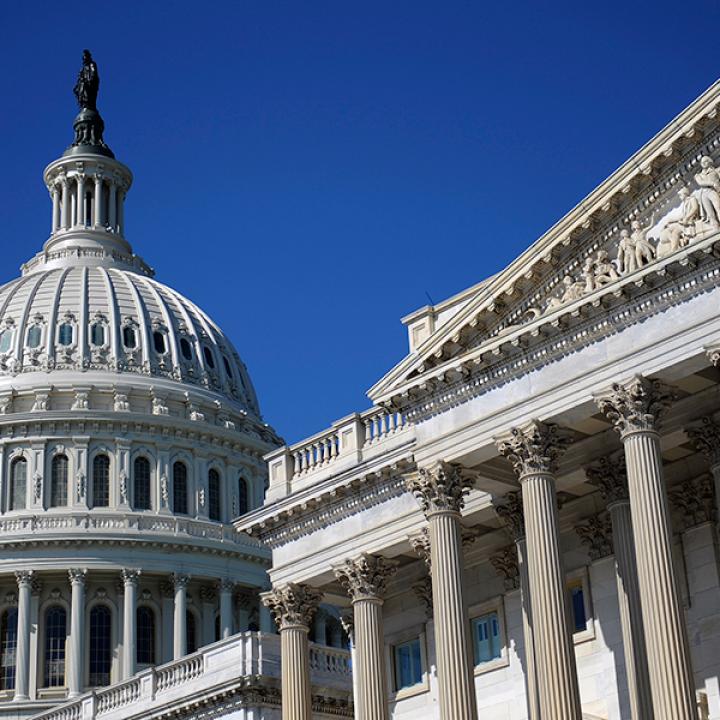
- Policy Analysis
- Congressional Testimony
Attacking Hezbollah's Financial Network: Policy Options
Jun 8, 2017

About the Authors
Articles & Testimony
A former Treasury official describes how the group has continued to expand its criminal and operational activities worldwide despite the changes wrought by the Syria war and Iran nuclear accord.
The following is an excerpt from Dr. Levitt's prepared remarks. To read his full testimony, download the PDF.
Several concrete steps could be taken to strengthen current efforts and counter Hezbollah's ability to exploit the international financial system:
-
Designate additional Hezbollah entities as appropriate. HIFPA proscribes doing business with designated Hezbollah entities, so the more entities that are included in Treasury and State Department lists, the more impactful HIFPA will be. While Lebanese regulatory authorities intervened to prevent so-called "over-compliance" with the U.S. law by local banks and forestall further confrontation with Hezbollah, additional U.S. designations of the group's businessmen and businesses would give these banks cover to protect the Lebanese financial system from further abuse. This should include, but not be limited to, entities operating in Lebanon. Consider, for example, the list of Lebanese businesses designated along with Lebanon-based IRGC Qods Force operative Hasan Dehghan Ebrahimi in February 2017.
Targeting Hezbollah's criminal enterprises in South America, Africa, and Europe is important as well. Additionally, whenever possible, officials should inform the Treasury Department about any Hezbollah connections to actions taken under authorities other than support for terrorism, so that these can be covered by HIFPA as well (e.g., the counter-narcotics action taken against the Waked Money Laundering Organization).
Finally, officials should consider follow-on actions to existing designations where appropriate. For example, Ebrahimi was providing Hezbollah funds through Hezbollah's al-Waad construction firm, which was designated in 2009. Similarly, Hezbollah's "Equip a Mujahid" social media fundraising campaign was launched by Hezbollah's Islamic Resistance Support Organization (IRSO), which was designated in 2006. In fact, the Treasury Department revealed at the time that IRSO was raising funds for Hezbollah around the world using terms like "equipping a mujahid project."
-
Target key Hezbollah criminal support networks. Hezbollah's Foreign Relations Department has taken on a variety of criminal and operational functions over the past few years, so targeting its operatives and front organizations would deal a significant blow to the group. Similarly, Hezbollah increasingly relies on the services provided by "super facilitators" who may not be Hezbollah members themselves but provide the group with specialized services that are mission-critical for its criminal enterprises. Targeting these super facilitators would also be an effective way of undermining the group's ability to access and abuse the international financial system. The arrest, extradition, and forthcoming prosecution of designated Hezbollah financier Kassim Tajideen indicate a newfound willingness to target individuals or organizations that play key roles in the group's criminal support networks, and stand in stark contrast to the failure to secure the extradition of other arrested Hezbollah supporters around the world (e.g., Ali Fayyad, who was arrested in the Czech Republic but later released to Lebanon).
-
Apply secondary sanctions under HIFPA to financial institutions that bank Hezbollah or its associates outside the Middle East, such as in Africa or Latin America. This would serve as a powerful reminder of HIFPA's global reach and minimize the impact on Lebanon's financial sector. Consider a financial institution like Balboa Bank & Trust, which was designated by the Treasury Department in the context of the action taken against the Waked Money Laundering Organization.
-
Revisit the question of designating Hezbollah as a Transnational Criminal Organization. The outing of Hezbollah's Business Affairs Component resulted from a series of DEA cases run under the rubric of "Project Cassandra," which targeted "a global Hezbollah network responsible for the movement of large quantities of cocaine in the United States and Europe." But there are many other recent cases in which transnational organized criminal activities were carried out by people with formal, even senior ties to Hezbollah. Accordingly, the group's status as a transnational criminal organization (TCO) should be revisited.
-
Resume sanctioning Iran for state sponsorship of Hezbollah (and other) terrorism. The group continues to receive significant funding and resources from Iran. Without undermining the JCPOA, which is limited to nuclear development and proliferation, more vigorous action could be taken against Iranian entities such as the IRGC Qods Force, Mahan Air, and a host of others involved in Tehran's support for terrorism. The designation of Hasan Dehghan Ebrahimi in February 2017 was a move in the right direction.
- Enhance interagency coordination and cooperation against the Iran Threat Network (ITN). All of the policy options laid out here require close interagency coordination and cooperation. In the past, that has been in short supply when it comes to dealing with Iran, Hezbollah, and Tehran's other proxies. Today, organized Shia militias closely tied to Iran are operating in Iraq and Syria. These include Shia militants not only from Iraq and Lebanon, but also from Pakistan, Afghanistan, the Gulf, and Africa. Designations and other interagency actions targeting ITN actors allied with Hezbollah would go a long way toward undermining some of the group's key partners. The ITN threat is growing, not shrinking, and demands maximum coordination between the intelligence community, law enforcement, regulatory bodies, and policy departments and agencies. One positive sign in this regard is the use of convening bodies such as the Global Counterterrorism Forum (GCTF) and the Law Enforcement Coordination Group (LECG) to address best practices for countering Hezbollah's terrorist, criminal, and other illicit activities.
Matthew Levitt is the Fromer-Wexler Fellow and director of the Stein Program on Counterterrorism and Intelligence at The Washington Institute.
House Foreign Affairs Committee




